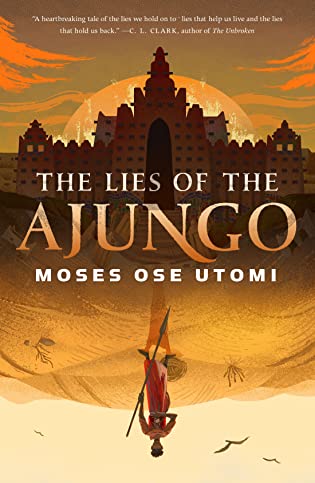 The Lies of the Ajungo (Forever Desert, #1) by Moses Ose Utomi
The Lies of the Ajungo (Forever Desert, #1) by Moses Ose Utomi Format: eARC
Source: supplied by publisher via Edelweiss
Formats available: hardcover, ebook
Genres: epic fantasy, fantasy
Series: Forever Desert #1
Pages: 96
Published by Tordotcom on March 21, 2023
Purchasing Info: Author's Website, Publisher's Website, Amazon, Barnes & Noble, Kobo, Bookshop.org, Better World Books
Goodreads
Moses Ose Utomi's debut novella, The Lies of the Ajungo, follows one boy’s epic quest to bring water back to his city and save his mother’s life. Prepare to enter the Forever Desert.
A Library Journal Best Book of the Month! They say there is no water in the City of Lies. They say there are no heroes in the City of Lies. They say there are no friends beyond the City of Lies. But would you believe what they say in the City of Lies? In the City of Lies, they cut out your tongue when you turn thirteen, to appease the terrifying Ajungo Empire and make sure it continues sending water. Tutu will be thirteen in three days, but his parched mother won’t last that long. So Tutu goes to his oba and makes a deal: she provides water for his mother, and in exchange he will travel out into the desert and bring back water for the city. Thus begins Tutu’s quest for the salvation of his mother, his city, and himself.
The Lies of the Ajungo opens the curtains on a tremendous world, and begins the epic fable of the Forever Desert. With every word, Moses Ose Utomi weaves magic.
My Review:
The Lies of the Ajungo is a story that reads like a myth, and is also a story about mythmaking, sitting comfortably at the intersection of fable and fantasy and making the reader uncomfortable in its stark descriptions of how easily people can be led to believe a lie – and the lengths that the powerful will go to maintain it.
If those people are desperate enough and if their oppressors are both ruthless and clever. Very, very clever.
Tutu grew up under the incessant drumbeat of the oppressive, repressive, depressive mantras about his city. A city that has come to be known as ‘The City of Lies’. But Tutu is too desperate to let those endlessly repeated phrases keep him from his quest to be a hero for his city and find water to save his city and his mother. Mostly, to save his mother.
What he finds on his trek through the Forever Desert is that everything that has been said about his city is a lie, and that the name is the biggest lie of all.
He finds friends and companions. They help train him to become a hero – and he helps to train them as well. And they all believe in each other – because they are all from ‘The City of Lies’ and nothing about any of their cities is what they thought. Or were taught. Or believed.
They find the truth, a truth that has the possibility of setting their cities free of the lies told by their conquerors.
If only the rest of their people can set aside all the lies they have been told and tear down each city’s Palace of Lies.
Escape Rating A+: I loved this when I read it last year for a Library Journal review, and I loved it just as much when I reread it last week. It’s an awesome and thoughtful story and I don’t think I can do it justice, but I’m going to try.
The story begins as a tragic but rather typical epic fantasy-type quest. When Tutu sets out he’s the young hero, the chosen one, setting out to save his people. We’ve seen this story before, and if it had continued in that vein it would have been beautifully written but not necessarily special beyond that.
And that’s where it takes its turn into that something special, as Tutu gets a big chunk of his naivete blasted away, learns that his quest has a cost, and discovers that he and his city are not alone. That a heinous crime is being committed, and committed in such a way as to inflict maximum cruelty at minimum cost to as many people as possible.
Which is when the story shifts from epic quest for water to even more epic quest for justice. The truth sets Tutu and his companions free, even as it grieves them for everything that all of their peoples have lost over the centuries, and just how terribly they have all been betrayed.
What made this even more fascinating is that there’s no magic involved in any of it. There’s no Sauron or Palpatine. No monster and no supervillain. It’s just people behaving very, very badly and other people being at first terribly gullible and eventually just terribly downtrodden.
While Tutu learns, to his cost, that both sides are invested in maintaining that narrative, whether because they want to keep the power they have illicitly gained or because they can’t bear to have their illusions destroyed of simply because they’ve just drunk way too much of the ‘kool-aid’ and can’t let go of their beliefs.
It’s possible to read The Lies of the Ajungo as merely the epic quest it first appeared to be. But the more one thinks about it, the more the sand of that desert blows into the cracks of that initial interpretation. It’s a story that stuck with me the first time I read it, and it’s still sticking this time as well.
I always love a good story that also makes me think, and The Lies of the Ajungo is most definitely that. I highly recommend this quickly read fantasy that will leave you with a long book hangover of was and would be and might have been and might yet be kinds of thoughts.
The Forever Desert is a place that is more than capable of holding multiple legends, but when I read The Lies of the Ajungo last year it seemed as if those stories would remain untold. I’m very happy to say that is no longer the case, and a second story from the Forever Desert, The Truth of the Aleke, will be published this time next year. A story which sounds every bit as beautiful, harrowing and yes, legendary, as this first one.

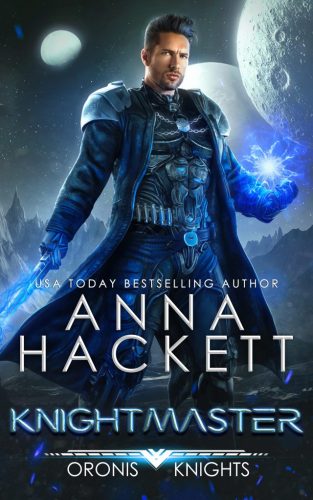 Knightmaster (Oronis Knights #1) by
Knightmaster (Oronis Knights #1) by  We first met the Oronis Knights in
We first met the Oronis Knights in  Escape Rating A-: Their hunt for the knightqueen’s kidnappers lead Kennedy and Knightmaster Ashtin Caydor from scummy space stations with even scummier information brokers to a jungle planet that seems designed to eat them both alive before they can discover the next clue. They’re in a race against time while not knowing their enemy’s true purpose or how much time they have left. If it isn’t already too late.
Escape Rating A-: Their hunt for the knightqueen’s kidnappers lead Kennedy and Knightmaster Ashtin Caydor from scummy space stations with even scummier information brokers to a jungle planet that seems designed to eat them both alive before they can discover the next clue. They’re in a race against time while not knowing their enemy’s true purpose or how much time they have left. If it isn’t already too late.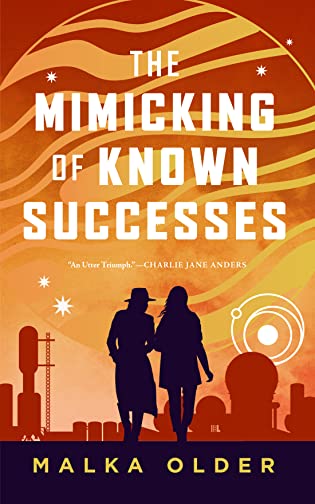 The Mimicking of Known Successes (Investigations of Mossa & Pleiti, #1) by
The Mimicking of Known Successes (Investigations of Mossa & Pleiti, #1) by 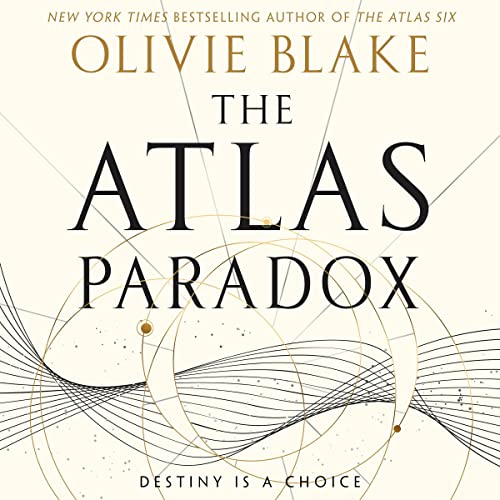 The Atlas Paradox (The Atlas, #2) by
The Atlas Paradox (The Atlas, #2) by  This story of dark academia, utter corruption and potentially the end of the world follows directly after the events of
This story of dark academia, utter corruption and potentially the end of the world follows directly after the events of  The Atlas Six
The Atlas Six A Tempest at Sea (Lady Sherlock #7) by
A Tempest at Sea (Lady Sherlock #7) by  Because the detective who just so happens to be aboard the Provence is none other than the intelligent and implacable Inspector Brighton, a Scotland Yard CID investigator that Holmes got the better of – read as exposed that the Inspector’s implacability had sent him barking up the wrong suspect tree – in
Because the detective who just so happens to be aboard the Provence is none other than the intelligent and implacable Inspector Brighton, a Scotland Yard CID investigator that Holmes got the better of – read as exposed that the Inspector’s implacability had sent him barking up the wrong suspect tree – in  That niggle aside, the mystery was still fascinating. I loved watching Charlotte work while hiding behind the kind of character masking that the original Holmes did so well – instead of hiding behind Sherlock Holmes himself.
That niggle aside, the mystery was still fascinating. I loved watching Charlotte work while hiding behind the kind of character masking that the original Holmes did so well – instead of hiding behind Sherlock Holmes himself.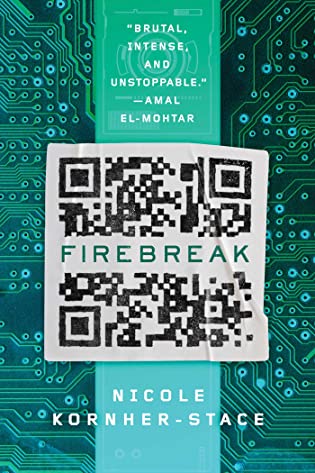 Firebreak by
Firebreak by  Escape Rating A+: It’s not about the game. It’s about the world that the game lets everyone escape from while packaging and selling the war – and every control and draconian measure that goes along with it – to everyone at the same time.
Escape Rating A+: It’s not about the game. It’s about the world that the game lets everyone escape from while packaging and selling the war – and every control and draconian measure that goes along with it – to everyone at the same time.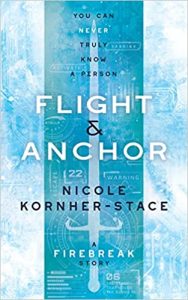 The way that Firebreak DOES link to
The way that Firebreak DOES link to 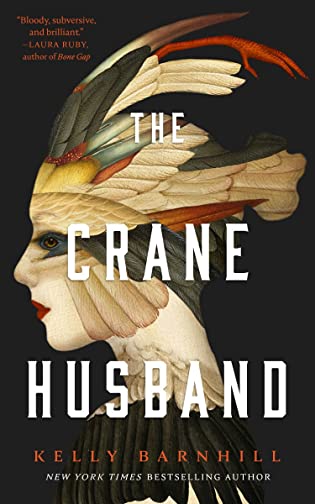 The Crane Husband by
The Crane Husband by  The Sister Effect by
The Sister Effect by 
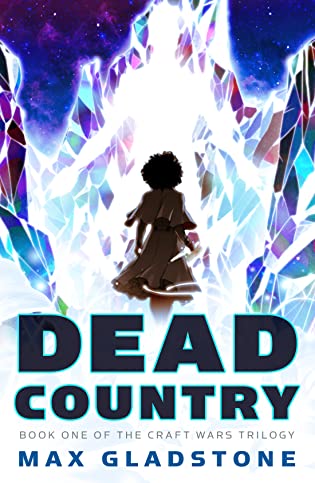 Dead Country (Craft Wars, #1) by
Dead Country (Craft Wars, #1) by 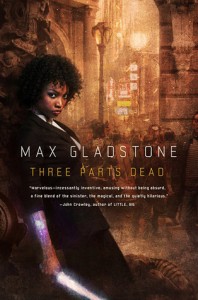 Escape Rating A: Once upon a time (back in 2012) there was a book titled
Escape Rating A: Once upon a time (back in 2012) there was a book titled 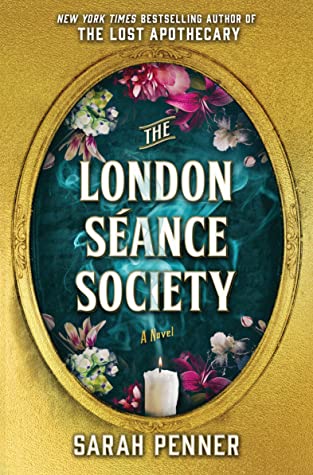 The London Séance Society by
The London Séance Society by  Escape Rating A: I picked up The London Séance Society because I enjoyed the author’s debut novel,
Escape Rating A: I picked up The London Séance Society because I enjoyed the author’s debut novel, 